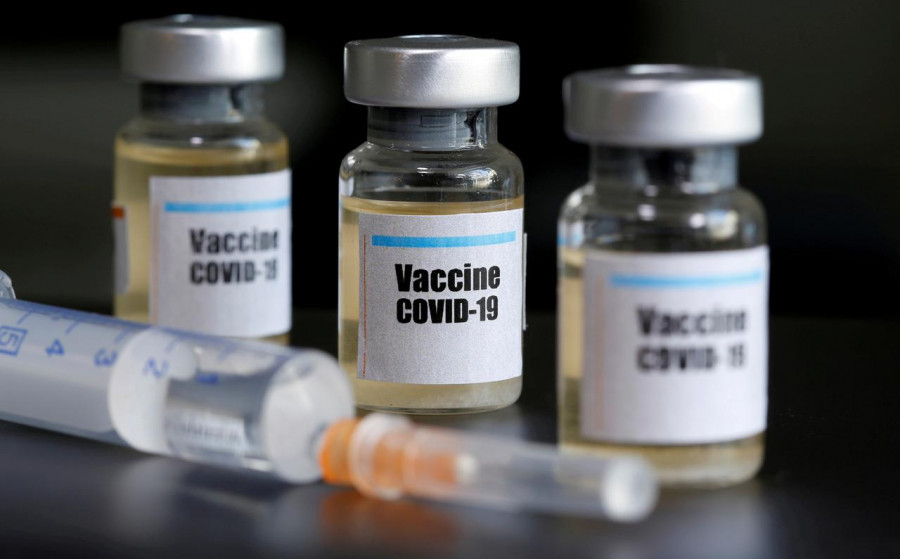Health
Nepal joins the race to get the vaccine. But when and how is still up in the air
Writing to foreign governments is all good, but the government needs to be proactive in acquiring it as the whole world is in the queue, and legwork here for storage and transport is needed, experts say.
Arjun Poudel
The promising news is that various international companies have finally found coronavirus vaccines, with at least five firms completing the third phase trials or getting close to doing so. Concern in Nepal, however, is when they will be available for the masses.
The government has sent diplomatic notes to at least five countries, whose vaccines against the coronavirus have either completed the third phase trials or are near their completion, for early availability in Nepal.
Experts, although welcoming the initiative, say that the government needs to be more proactive since the whole world will be after the vaccines once they are mass produced following regulatory approval, which is yet to happen.
“Authorities concerned should make extra efforts, including holding high level dialogue, mobilising diplomatic missions in those countries and keep requesting ambassadors of those countries to Nepal,” Dr Sarad Onta, a public health expert, told the Post.
It could be at least a year before vaccines are available in the numbers needed for the world, according to manufacturers.
The Ministry of Health and Population, through the Ministry of Foreign Affairs, has sent diplomatic notes to those vaccine-producing countries, seeking their support to make the vaccines available after their products are ready for use, according to an official.
“We have sent diplomatic notes to India, China, Russia, the United Kingdom and the United States,” Dr Roshan Pokhrel, chief specialist at the Ministry of Health, told the Post. “The government is committed to immunising all who need to be.”
On November 18, President Bidya Devi Bhandari endorsed an ordinance to amend the Drug Act (1978) to facilitate the use of emergency medicines and vaccines for Covid-19 that have been tested and approved in other countries.
According to the Health Ministry, 72 percent of the country needs to be immunised as children below 14, who account for 28 percent of Nepal’s population, cannot be immunised.
Of them, vaccines for the 20 percent population will be provided by the World Health Organization under its COVAX programme.
COVAX is a collaboration, with more than two-thirds of the world engaged, and has the world’s largest and most diverse portfolio of potential Covid-19 vaccines. It is co-led by Gavi, the global vaccine alliance, and the World Health Organisation.
“We are working to secure a vaccine for the 52 percent of the population after it becomes available for use,” said Pokhrel. “We will request for grants.”
Generally, about 50 percent of the vaccines, mostly for children, that Nepal receives come in the form of grants while the government pays for the rest. The proportion of vaccines that come to Nepal as grant has gradually been going down of late.
But public health experts express caution on the government’s plan to access vaccines in grants as the whole world will be in line for vaccines.
“The government should give up the idea to acquire all vaccines in grant,” said Onta. “The government must prepare to purchase at subsidised rates and for that cost estimation should be made and resources need to be diverted and work to find the foreign aid.”
The government’s plan to purchase through government-to-government deals has also come under criticism.
“We should not forget that all the countries and territories throughout the globe might have written such notes to those countries and those vaccine producing countries do not give to others without giving to their own population first,” said Onta. “Strong political will is needed to acquire the vaccine at the earliest.”
Eight vaccine candidates, which have either completed the third phase trial or are about to do so, are produced by the five countries to which the government has sent diplomatic notes.
However, all vaccine candidates are not suitable for Nepal, as the existing storage structure does not support them, according to Dr Shyam Raj Upreti, coordinator of the government’s Covid-19 vaccine advisory committee.
Various reports on the vaccine candidates suggest their potency depends on the proper storage.
According to reports, the preliminary efficacy analysis of Pfizer and Biontech’s vaccine, the product of American and German companies, demonstrates 95 percent effectiveness. However, the vaccine needs to be stored in minus 60 to minus 90 degrees Celsius—ideally minus 70 degrees Celsius.
Officials say Nepal may face a challenge in terms of facilities to store the vaccine.
Moderna’s vaccine candidate is reportedly to be 94.5 percent effective. It does not require the coldest temperature of minus 70 degrees Celsius like the one by Pfizer and Biontech. It, however, requires long term storage in minus 20 degrees Celsius, which may again create challenges for storage and distribution in Nepal.
Reports suggest it is stable for 30 days between 2 to 8 degrees Celsius. As all existing vaccine storages can only refrigerate at around 2 to 8 degrees Celsius, they need to be upgraded, if the vaccine has to be used in Nepal, say experts.
Sputnik V, the Russian vaccine, is reported to have been 92 percent effective. It was granted approval for emergency use in August.
The Sputnik V vaccine’s liquid form must be stored at minus 18 degrees Celsius or below to maintain its stated 92 percent efficacy, according to reports.
Like Moderna’s vaccine, all existing vaccine storages need to be upgraded, if the vaccine’s liquid form has to be used in Nepal.
So far the most encouraging signs, as far as Nepal is concerned,
are from the University of Oxford and AstraZeneca vaccine. This vaccine is said to be 70 to 90 percent effective in phase III trial. The vaccine can be stored, transported and handled at standard refrigerated conditions. The company has agreed to make a vaccine not for profit for the duration of the pandemic.
It is produced by Serum Institute of India, which is the world’s largest producer of the human vaccine. It is estimated that around 65 percent of children in the world currently receive at least one of its vaccines, which include polio, diphtheria, tetanus, pertussis, Hib, Hepatitis B, measles and rubella.
“Going by reports so far, AstraZeneca’s vaccine appears to be suitable in our context and we have made recommendations to the government along the lines,” said Dr Janak Koirala, an infectious disease expert who is also a clinical trial consultant at the Nepal Health Research Council.
According to chief specialist Pokhrel, the Health Ministry is looking for a coronavirus vaccine developed by the University of Oxford and AstraZeneca, a British-Swedish company, as the existing storage system of the country supports storage and supply.
“We do not have the facility to store Pfizer and Biontec vaccines and have to upgrade existing storage facilities to use Moderna’s vaccine,” said Pokhrel.
There are other Covid-19 vaccines that also have drawn a lot of attention.
Two Covid-19 vaccines including BBIBP-CorV developed by Beijing Institute of Biological Products, a subsidiary of China National Biotec Group, are in the final stage trial. Reports suggest the vaccines produced by the company can be stored at 4 degrees Celsius for a longer period of time or at room temperature for a week.
Another vaccine, Coronavac, developed by Chinese biopharmaceutical company Sinovac is also in phase III trial. The company is yet to reveal its efficacy but hundreds of thousands of people are believed to have been inoculated already in China. This too, according to the company, can be stored in a normal refrigerator temperature of 2 to 8 degrees Celsius and may remain stable for up to three years.
Vaccines produced in China and Russia, if their efficacy is equal to the one from AstraZeneca, should be brought here too, Koirala said.
“But the vaccine needs to be certified by the World Health Organization first, even for emergency use,” Koirala said. “We have recommended it accordingly.”
But given the options available and the preferences the world will have, public health experts suggest readiness on the government’s part.
“We should start scaling up our storage facilities,” said Onta.
According to Koirala, the coronavirus vaccine provided under the COVAX programme will be first given to the frontline workers and the people having pre-existing conditions.
He said the government-procured vaccines will be administered throughout the country like in the mass immunisation programme free of charge.
But there is work to be done here before the vaccine arrives, according to experts.
“The government should not forget the technical part—supply and storage of the vaccine, training for health workers, which is equally important,” said Onta. “Even if we get the vaccine immediately, it has to fulfil a rigorous process to reach the arm of the people. There are so many challenges that we have to overcome.”




 20.72°C Kathmandu
20.72°C Kathmandu















